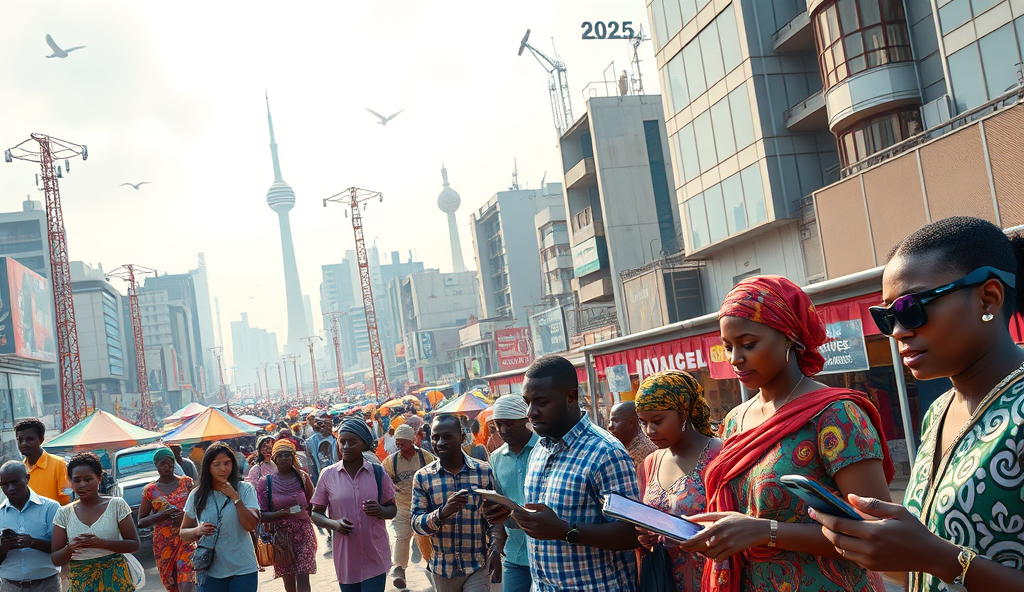Introduction to Internet Connectivity Challenges for Students in Nigeria
Nigerian students face persistent internet connectivity issues, with only 36% of the population having reliable broadband access according to 2023 NCC data. These challenges disproportionately affect academic performance, as over 60% of university students rely on mobile internet for research and virtual learning.
Urban-rural disparities worsen the situation, with Lagos enjoying 45% 4G coverage while northern states like Zamfara struggle below 15%. Frequent network outages and high data costs force students to spend 20-30% of their monthly budgets on internet subscriptions.
These systemic barriers highlight why understanding Nigeria’s current connectivity landscape is crucial for developing sustainable solutions. The next section will analyze the specific factors shaping internet access across different regions.
Key Statistics

Current State of Internet Connectivity in Nigeria
Nigerian students face persistent internet connectivity issues with only 36% of the population having reliable broadband access according to 2023 NCC data.
Nigeria’s internet connectivity remains uneven, with urban centers like Lagos and Abuja benefiting from 4G coverage while rural areas lag behind, as highlighted by the NCC’s 2023 report showing only 36% broadband penetration. Mobile internet dominates usage, with MTN, Airtel, and Glo accounting for 85% of subscriptions, yet frequent outages and slow speeds plague users nationwide.
The average internet speed in Nigeria hovers around 10 Mbps, far below the global average of 35 Mbps, with peak speeds in Lagos (15 Mbps) contrasting sharply with northern states like Sokoto (5 Mbps). High data costs compound these issues, as 1GB of mobile data consumes nearly 10% of the minimum wage, forcing students to ration connectivity.
Despite recent 5G rollouts by MTN and Airtel in major cities, coverage gaps persist, particularly in educational hubs like Nsukka and Zaria where students struggle with subpar infrastructure. These disparities set the stage for examining how connectivity challenges directly impact academic performance in the next section.
Impact of Poor Internet Connectivity on Nigerian Students
The average internet speed in Nigeria hovers around 10 Mbps far below the global average of 35 Mbps with peak speeds in Lagos (15 Mbps) contrasting sharply with northern states like Sokoto (5 Mbps).
Nigeria’s unreliable internet speeds and frequent outages severely disrupt e-learning, with 68% of university students reporting missed deadlines due to connectivity issues according to a 2023 NOUN survey. Students in rural institutions like FUT Minna face greater hurdles, often traveling to urban centers for stable connections, wasting valuable study time and resources.
The high cost of mobile data forces students to prioritize essential tasks, with many unable to access video lectures or research materials—UNICEF reports only 23% of Nigerian students have consistent online learning access. This digital divide exacerbates educational inequalities, particularly affecting northern states where speeds average 5 Mbps compared to southern urban centers.
These challenges highlight the urgent need for solutions, setting the stage for evaluating current government and private sector efforts to bridge Nigeria’s connectivity gaps in the next section.
Government and Private Sector Initiatives to Improve Internet Access
Nigeria’s unreliable internet speeds and frequent outages severely disrupt e-learning with 68% of university students reporting missed deadlines due to connectivity issues according to a 2023 NOUN survey.
Recognizing Nigeria’s connectivity crisis, the federal government launched the National Broadband Plan 2020-2025, targeting 70% broadband penetration by 2025, though current figures hover at 48% according to NCC data. Private telecom giants like MTN and Airtel are expanding 4G coverage to rural areas, with MTN investing $1.6 billion in infrastructure upgrades to reach underserved regions like northern states.
The Universal Service Provision Fund (USPF) has partnered with ISPs to deploy over 200 community broadband centers, including at universities like UNILAG and ABU, offering subsidized rates for students. Meanwhile, MainOne’s 7,000km submarine cable and Glo’s nationwide fiber rollout aim to stabilize Nigeria’s internet speed, currently ranked 103rd globally by Ookla.
While these efforts show promise, affordability remains a hurdle—setting the stage for exploring budget-friendly solutions tailored for students in the next section.
Affordable Internet Solutions for Students in Nigeria
The federal government launched the National Broadband Plan 2020-2025 targeting 70% broadband penetration by 2025 though current figures hover at 48% according to NCC data.
Despite infrastructure improvements, Nigerian students still need cost-effective internet access, with USPF’s subsidized campus broadband centers at UNILAG and ABU serving as viable models. Some ISPs like Spectranet now offer student-exclusive packages, including 50GB monthly plans for ₦5,000—40% cheaper than standard rates.
Public universities are negotiating bulk data deals, exemplified by UNN’s partnership with Smile Communications providing 10GB for ₦2,500 monthly. Meanwhile, shared community Wi-Fi hotspots powered by MainOne’s submarine cables deliver stable connections at ₦200/hour in Lagos and Abuja.
For remote learners, MTN’s Edu360 bundles combine 4G data with e-learning platform access at ₦1,000/week. These solutions bridge the affordability gap while setting up our discussion on optimized mobile data plans next.
Best Mobile Data Plans for Students in Nigeria
Public universities are negotiating bulk data deals exemplified by UNN’s partnership with Smile Communications providing 10GB for ₦2500 monthly.
Building on the affordable solutions discussed earlier, Nigerian telecom providers now offer specialized mobile data plans catering to students’ academic needs. Airtel’s Student Bundle provides 6GB for ₦1,500 valid for 30 days, while Glo’s Campus Booster offers 7.5GB at ₦2,000 with free midnight browsing—ideal for late-night study sessions.
MTN leads with its Student Data Pack, delivering 10GB (5GB daytime + 5GB nighttime) for ₦2,500 monthly, complemented by free access to educational platforms like Udemy. 9mobile counters with Smart Campus packages starting at ₦1,200 for 4GB plus bonus YouTube data, addressing video lecture consumption.
These competitively priced plans demonstrate how mobile networks are bridging Nigeria’s internet affordability gap, though speed optimization remains crucial—a focus we’ll explore next when examining budget-friendly connectivity enhancements.
How to Optimize Internet Speed on a Limited Budget
Maximize your student data plans by scheduling bandwidth-heavy tasks like video lectures during off-peak hours (10 PM–5 AM), when networks like Glo and MTN offer free or bonus nighttime data. Simple tweaks like disabling auto-updates on apps and using data-saving modes on YouTube can stretch your 4GB–10GB allocations further while maintaining Nigeria internet speed for critical academic tasks.
For congested campuses, switching between 4G and 3G networks often improves reliability—MTN’s 4G/LTE coverage reaches 72% of urban areas but falls to 53% in rural zones, per NCC 2023 data. Free tools like Cloudflare’s 1.1.1.1 DNS or Google’s Public DNS can accelerate browsing by reducing latency, especially when accessing global educational platforms included in your plan.
Offline solutions complement limited budgets: download course materials during free midnight browsing periods and use lightweight apps like Opera Mini. As we explore utilizing public Wi-Fi safely next, remember these optimizations ensure consistent connectivity despite Nigeria’s fluctuating broadband penetration rates.
Utilizing Public Wi-Fi Safely and Effectively
Public Wi-Fi hotspots in Nigerian universities and cafes can supplement mobile data, but always verify network authenticity to avoid “Evil Twin” attacks—cybercriminals often mimic legitimate networks in high-traffic areas like UNILAG or ABU campuses. Use VPN services like TunnelBear or ProtonVPN to encrypt traffic when accessing sensitive academic portals, as Nigeria’s cybercrime rate increased by 23% in 2023 according to NCC reports.
Prioritize networks with WPA3 encryption, commonly available at co-working spaces like CcHub Lagos, and disable file-sharing settings to prevent unauthorized access. Combine this with DNS tools like Cloudflare (mentioned earlier) to maintain Nigeria internet speed while adding an extra security layer for research on global platforms.
When public Wi-Fi becomes unreliable—common during peak hours—transition seamlessly to offline tools, which we’ll explore next, ensuring uninterrupted study sessions regardless of connectivity challenges.
Offline Learning Tools to Complement Internet Access
When Nigeria’s internet reliability fluctuates, students can leverage offline tools like Khan Academy’s downloadable courses or Google Drive’s offline mode, which syncs materials when connectivity returns. Local platforms like Pass.ng offer downloadable past questions for WAEC and JAMB, crucial for exam preparation during network outages.
For research, apps like Pocket or Instapaper save web articles offline, while Zotero organizes citations without constant internet access—ideal for students at universities like UNIBEN or UI. Offline Wikipedia (KiwiX) provides 90% of English content without data, addressing Nigeria’s mobile internet gaps in rural campuses.
These tools ensure productivity during disruptions, bridging gaps until broader infrastructure improvements—a transition we’ll explore next through advocacy efforts for better Nigeria internet speed and coverage.
Advocacy and Community Efforts for Better Internet Infrastructure
While offline tools help students navigate Nigeria’s unreliable internet, lasting solutions require collective action—like student-led petitions at UNILAG demanding better campus Wi-Fi or #DataMustFall campaigns pressuring providers to reduce costs. Organizations like Paradigm Initiative train rural communities to advocate for infrastructure upgrades, leveraging Nigeria’s National Broadband Plan targeting 70% coverage by 2025.
Local tech hubs, including Co-Creation Hub in Lagos, collaborate with ISPs to pilot affordable data plans for universities, addressing gaps in Nigeria’s broadband penetration. Meanwhile, grassroots initiatives like SurfShool NG educate students on reporting service outages to regulatory bodies like NCC, ensuring accountability for internet reliability.
These efforts complement offline workarounds by tackling systemic issues—a foundation for the policy and investment shifts we’ll examine next in concluding Nigeria’s path to improved connectivity.
Conclusion: The Way Forward for Improved Internet Connectivity
Nigeria’s internet connectivity challenges require collaborative efforts from government, ISPs, and educational institutions to bridge the digital divide for students. With broadband penetration at just 48% as of 2023, targeted investments in infrastructure and policies like the National Broadband Plan 2020-2025 must be prioritized to meet growing demand.
Students can leverage solutions like community Wi-Fi hubs and discounted data plans from providers like MTN and Airtel while advocating for better services. The planned 5G rollout by major telcos could further transform connectivity if affordability and coverage gaps are addressed.
As Nigeria moves toward its digital future, sustained advocacy, localized innovations, and policy enforcement will determine whether students can fully harness online learning opportunities. The next steps involve holding stakeholders accountable while exploring creative workarounds for immediate relief.
Frequently Asked Questions
How can Nigerian students access affordable internet for online learning?
Use student-exclusive data plans like MTN's Edu360 (₦1,000/week) or campus broadband centers offering subsidized rates at UNILAG and ABU.
What offline tools can help students study during internet outages?
Download Khan Academy courses or use KiwiX for offline Wikipedia access—ideal when Nigeria's mobile networks are unstable.
Which mobile network offers the best nighttime data for students?
Glo's Campus Booster provides 7.5GB plus free midnight browsing—perfect for late-night study sessions on a budget.
How can students improve slow internet speeds in rural campuses?
Switch between 4G/3G networks and use Cloudflare's 1.1.1.1 DNS to reduce latency especially in northern states with 5Mbps averages.
What safety measures should students take when using public Wi-Fi?
Always enable VPNs like ProtonVPN and verify network authenticity to prevent cyberattacks common in Nigerian university hotspots.


